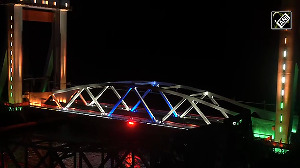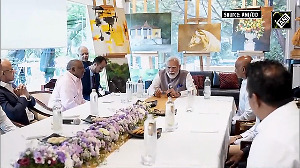Canadian government officials delayed the process of obtaining a wiretap warrant against the key figure in the Air India bomb plot Talwinder Singh Parmar because of religious concerns, a former intelligence officer has said.
Testifying before the Air India inquiry commission, Glenn Gartshore, who was the officer in charge of the Sikh extremism desk at the Canadian Security Intelligence Service, said, "There were concerns we were targeting the Sikh religion."
CSIS considered Parmar to be extremely dangerous, and wanted a warrant to intercept his conversations in the fall of 1984, about nine months before the bombing on June 23, 1985.
But a hurdle was erected by the office of Elmer MacKay, who was then solicitor-general, the progressive conservative minister responsible for CSIS.
The minister's office delayed the warrant application for a considerable period, Gartshore said, because the government did not want to be seen as targeting a religious group.
CSIS, in fact, was not investigating the Sikh religious community, but was very interested in individuals such as Parmar, who was considered a terrorist threat, Gartshore was quoted as saying by Canadian daily The Globe and Mail.
It took five months from the time CSIS initiated the process for a federal court to approve the wiretap warrant on Parmar, a frustrating delay, Gartshore said.
Lawyers for the families of victims of the Air India bombing say there is no way to know whether Canadian authorities might have learned enough to thwart the bombing if a wiretap had been installed on Parmar's phone earlier.
Parmar is considered by Canadian authorities to have been the mastermind of the bomb plot. He was subsequently killed in a shootout with Indian police.
Gartshore said CSIS had to rely on wiretap information because the service did not have any significant human sources within the Sikh community.
The service didn't even have a good photograph or physical description of Parmar.
Parmar, who was wanted on murder charges in India, had been detained by German authorities during European travels in early 1984, but was released because the Germans feared he would be subjected to human-rights abuses if deported to India, Gartshore said.
He returned to Canada. He was a Canadian citizen and again the Indian government sought his extradition. However, the Department of External Affairs shared the same concerns about the Indians' human-rights record, preventing Parmar's extradition, Gartshore said.
Russell Upton, who was Gartshore's boss at the anti-terrorism branch, said the federal government had difficulty with security cases while the RCMP was turning over its intelligence responsibilities to the new civilian agency, CSIS.
"I never felt I had adequate resources for Sikh extremism problems," Upton said.
The new process for obtaining wiretaps was like "putting toothpaste back in the tube," he added.
The inquiry, headed by retired Supreme Court of Canada judge John Major, is currently investigating what Canadian authorities knew before Air India was bombed, and 329 people were killed.
The inquiry will then look at how Canadian officials dealt with the case during the 22 years since the bombing.






 © 2025
© 2025